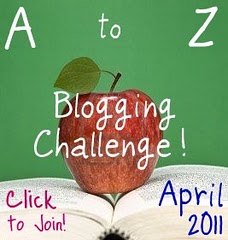Wednesday, March 30, 2011
A to Z Blogging Challenge
We're going to give it a try here at Seton Hill Writers, with, obviously, a writerly theme. :)
So, check back here starting on Friday, April 1 (Hhm...April Fool's Day), to see how it goes.
Monday, March 28, 2011
literature as art
In recent years it seems we must turn to the genres of fantasy and science fiction to examine the nature of reality. In China Mieville's Perdido Street Station the "Remade" technology makes much of the world appear Cubist. For example, in the bordello, Each room contained some unique flesh-flower, blossom of torture. David paced past naked bodies covered in breasts like plump scales; monstrous crablike toros with nubile girlish legs at both ends... It just gets more freaky from there.
The Stars My Destination by Alfred Bester gets quite surreal towards the end: Sound came as sight to him, as light in strange patterns. ...Motion came as sound to him. He heard the writhing of the flames, he heard the swirls of smoke, the heard the flickering, jeering shadows...all speaking deafeningly in strange tongues... The surreality continues as Color was pain to him..., Touch was taste to him..., and Smell was touch...
It's curious that so much of modern art has left representation behind but modern literature embraces it. Perhaps readers don't want non-representative prose? What do you think?
Friday, March 25, 2011
write slow or write fast?
It takes skill to work slowly. When I was in graduate school, a classmate complained, "I wrote for five hours today and only got one paragraph."
I replied: "I'm not a good enough writer yet to do that."
Clearly there are two different approaches to writing: slow or fast.
For example, here are some more quotes related to writing:
- If my doctor told me I had only six minutes to live, I wouldn't brood. I'd type a little faster. --Isaac Asimov
- Write your first draft with your heart. Re-write with your head.--the movie Finding Forrester
- Don't get it right, just get it written.--James Thurber
Personally, I think there's something to be said for getting the first draft finished without getting bogged down by your internal editor/nay-sayer.
So, how about you? Do you write slow or write fast?
Tuesday, March 22, 2011
Sambuchino Interview
Some of my writer friends over at the Chiseled in Rock blog today have An Interview with Chuck Sambuchino, famous for his Guide to Literary Agents Editor's Blog.
Among many other things, Sambuchino says As writers, we all have certain hopes for our books. We want them to be in every bookstore across America. We want them to be translated and available in Europe. We want a book tour. Essentially, we want the book to have a chance to break out and sell lots of copies. Etc., etc. To do these big things, you need to get published by a large publisher who can make these goals realities. But big publishers won’t take unsolicited submissions from writers; you need an agent to get the attention of the large houses in NYC and elsewhere.
He has a lot of other good info. Check it out.
Monday, March 21, 2011
open door month
We’re publishing novels, either standalone or as part of greater series. Our novels are for adult readers; we’re not currently looking at work aimed at young teens or children.
All our books are “genre” fiction in one way or another — specifically fantasy, science fiction, horror, and that new catch-all urban or modern fantasy.
Our books will be published in all English-language territories — notably the UK, US and Australia — so we’ll be buying rights to cover all those.
Beyond all of this, what we’re really looking for in your writing is this:
• A “voice”, that comes from…
• Confident writing
• Pacy writing
• Characters that live, have real relationships and emotions, even in extreme situations
• A sense of vision, a rounded universe that lives and breathes
• Clever construction, good plotting, a couple of surprises even for us jaded old read-it-alls
• Heightened experience – an intensity, extremity or just a way of treating plot or situation in a way we’ve not come across before. “Goes up to 11″, if you know what that means.
Check out the website for more info. Good luck!
Friday, March 18, 2011
evolution of a query letter
a writer's life?
I came across a blog post by PaulsPen: Thou Shall Have Balance: The Ten Commandments of Teaching Creative Writing which touches upon many interesting ideas. For now, I'll focus on a writer's life. The author says, Creative writers, like most artists, need to be in it for the long run. and a little later, Within the writing life we also build a sense of community of likeminded people, a group that shares our appreciation for what is, inherently, a lonely, almost futile, pursuit. It’s good to have someone else along for the journey.
On the same subject, Natalie Goldberg says, in Writing Down the Bones, “Art lives in the Big World. One poem or story doesn’t matter one way or the other. It is the process of writing and life that matters.” Do you agree? Disagree?
Have you fashioned a writer's life for yourself? If not, why not?
If so, how?
Wednesday, March 16, 2011
Talent?
In How Not to Talk to Your Kids: The inverse power of praise by Po Bronson in "New York Magazine" the author says ...it's been noted that a large percentage of all gifted students ... severely underestimate their own abilities. ...They underrate the importance of effort.... and ...a growing body of research...strongly suggests...Giving kids the label of "smart" does not prevent them from underperforming. It might actually be causing it. And a little later ...those who think that innate intelligence is the key to success begin to discount the importance of effort. It's a fascinating article; I recommend it.
The other article is The Trouble with Bright Girls by Heidi Grant Halvorson on The Huffington Post. Halvorson says More often than not, Bright Girls believe that their abilities are innate and unchangeable, while bright boys believe that they can develop ability through effort and practice. And The net result: When learning something new is truly difficult, girls take it as sign that they aren't "good" and "smart," and boys take it as a sign to pay attention and try harder. We continue to carry these beliefs, often unconsciously, around with us throughout our lives. This one is fascinating, too, and also recommended.
These articles both seem to show that being labelled as smart--or talented--may not be a good thing.
How about you? Did your parents or teachers tell you you had a 'talent' for writing?
Do you think you're talented?
Monday, March 14, 2011
Writing Affirmations
- Everyone has a strong, unique voice.
- Everyone is born with creative genius.
- Writing as an art form belongs to all people, regardless of economic class
or educational level. - The teaching of craft can be done without damage to a writer's original
voice or artistic self-esteem. - A writer is someone who writes.
What do you think? Agree? Disagree? I think these affirmations can only help us become better writers! :)
Friday, March 11, 2011
myths of writing
- writing can't be taught
- people are born creative or uncreative
- creative writing is something done by a few geniuses
- writers are subject to the whims of an "Ah-ha!"-like moment of inspiration
- good writing proceeds inevitably from good ideas
- good writers compose nearly perfect drafts often at a single sitting
- writing is a rather magical, solitary occupation
- writers are more interesting than other people
For the most part, these myths do NOT help writers. They can actually interfere with our creativity.
How about you? Have you ever believed any of these ideas?
Wednesday, March 9, 2011
Publishing Trends
Publishing Trends 2011
Caleb's Predictions in trends, the landscape, and what you need to know.
2011 will bring the biggest shift in the publishing industry in history, and a massive shift in what it means to be an author.
THE LANDSCAPE -- what we saw in 2010, what to expect in 2011:
-- The second-most popular search engine in the world became YouTube, with Facebook coming third (Google was first, obviously).
-- For the first-time, the mainstay of traditional publishing began to falter -- sales of celebrity books. Major sales disappointments shook the industry, including Sarah Palin's latest book, and books from two reality show stars. (Celebrity books have typically been the best bet for publishers because they have access to media and a built-in fan base). There is now confusion among traditional publishers about where book buyers will come from in 2011.
-- Digital publishing makes it much easier and cheaper to do high quality books, even for amateur writers.
-- Oprah is expected to start her own publishing company, using the power of her new network and her brand to launch sales of books.
-- Barnes & Noble and Borders are in trouble. Borders lost $74 million during the fourth quarter of 2010, and BN asked for someone to buy the company. Borders was the only company to make an offer. Meanwhile, with sales of ebooks skyrocketing, many authors, even established authors, are beginning to think traditional publishers, who had bookstore distribution, may not be so useful to authors in 2011.
-- There is growing worry that traditional publishers cannot get timely books to market fast enough. Several nonfiction books have struggled because by the time publishers got them out, the information in them was months old and the world had changed.
-- Bestselling author of 12 books, Seth Godwin announced he will start his own imprint with Amazon, declining traditional publishing all together. This has sent a major shiver through the publishing industry, and more major authors are expected to follow his lead in 2011.
-- The New York Times will start an ebook bestsellers list in early 2011.
-- Google has announced Google Ebooks, a gamechanger which will allow indie authors and independent bookstores to have huge distribution -- something that has never happened before, and its all going to be happening in the "cloud" format.
-- Amazon has announced that it will now share its sales stats with authors.
-- Amazon has predicted that sales of ebooks on its website will outstrip sales of paperback and hardback books combined as early as 2011.
-- The former president of Shell Oil announced that by April 2011, gas prices in the U.S. would hit $4 a gallon on average, and he predicted they would hit $5 a gallon by Sept. 2012. This will drive sales of ebooks, and make it pricier to ship traditional books, and discourage people from driving to bookstores.
2011 TRENDS IN WRITING:
-- We will see a huge rise in the number of new publishing companies, and many of them will be ebook-only publishers.
-- In late 2010, some authors were able to get agents by offering a book for free on Kindle, and when that book rose into the bestsellers, agents began to call. Expect to see many more authors trying this route, and some of them with success.
-- Some of the established publishers, big and small, will announce they will become ebook-only publishers.
-- Independent writers -- those without publishing contracts or agents -- will have access to audiences they've never had before, and many of them will begin to show up on bestsellers lists.
-- There will be an upsurge in the success of writers focus on niche genres.
-- Several big-name authors will announce they are going independent. This could well include John Grisham, whose career was saved by ebooks in 2010.
-- There is a new trend among indie authors to try to sell 1,000 ebooks a month, and a group of authors on Amazon has begun keeping their own monthly "1K sellers" list.
-- Science-fiction and fantasy in genre are going to be a huge trend in 2011, sneaking their way into all other genres.
-- Within weeks we will begin to see ebooks set to music, and ebooks that are very interactive.
-- The good news for writers about ebooks is that the eformat discourages book sharing the way books were passed around in paper form, which will translate into more money for authors. Authors have already begun to see their back catalogs (their out of print books) begin to sell better than they ever have as they are discovered by new readers when they are re-released as ebooks. And an "out of print" book will no longer exist beginning in 2011. The books of writers, from now on, will always and forever be available as ebooks. This will translate into more books sales, and is huge boon to writers.
-- We will also begin to see books become shorter, in the eformat, where books can be priced more inexpensively. But we will also begin to see authors releasing a book every couple of months. As ebook readers begin to find favorite authors, they will begin to want more new books faster. This is going to be a huge trend with indie writers as the establishment tries to catch up to the new publishing model.
-- I'm predicting that we will see, in 2011, the rise of geography-based purchasing. When you are at Yellowstone National Park on family vacation, you'll find a slew of inexpensively prices ebooks in many genres about the park -- ebooks about the animals or geysers for the kids, complete with facts and fun and interactive features, and ebooks for the parents about the geology, the history, where to find the best hidden waterfalls and hiking routes. All of these geographic-bases sales will be short "books" priced to sell. And we will begin to see this all over America, at every tourist place and even nontourist places. This will open up a new genre of short writing.
WHAT YOU NEED TO KNOW FOR 2011 AS AN AUTHOR:
-- First-time authors can appeal more directly to the market to find an audience, using ebooks.
-- The successful authors will be those who learn to promote books digitally.
-- We will begin to see the rise of virtual author appearances and virtual author book tours in 2010. Authors will be making virtual appearances to writers groups and clubs and skype-chats to groups and on website and using apps.
-- Authors will find they will need a digital following in order to get a book deal with a publisher. Having a blog and a Twitter account will nolonger be enough. Publishers will demand that an author have a blog with a following.
-- The value of agents will be unchanged in 2011. Even if you don't ever use a traditional publisher again, you'll want to have an agent to protect your foreign and film rights, to make sure you get pay bumps based on sales spikes, and to help negotiate the online promotion of your ebooks.
-- The nature of having a publisher will change dramatically. The world of selling ebooks is new, and up and coming writers will need digital cover art -- which is crucial to ebook sales -- as well as one sentence ebook blurbs. For many of the new ebook publishing companies that will be born in 2011, their key selling feature will be their ability to offer these ebook-specific services to writers. Many writers who try to go it on their own in the ebook world will fail solely because they don't have the expertise to navigate the ebook sales experience.
-- As Amazon begins to offer authors their own sales data, virtual and actual book tours and promotions will begin to be driven by those data -- where in the country is the book selling best, to whom, and on which days.
--- The ebook market place will get crowded very fast. THE ONLY WAY for an author to stand out will be through narrative voice.
-- Plots will begin to be more science-fiction and fantasy driven, for two reasons -- people will be looking for escapist literature because of the reality of the economy, and because technology is changing so fast around us, and science fiction has always driven the trends of what can be imagined can become real.
-- Series writing is going to become hugely important in ebook format, as I mentioned earlier. Expect to see shorter book, but more of them, and readers will begin to expect this.
-- picture book sales will begin to revive in 2011, but not in actual book copies. There will be a boom in parents looking for ebook content for children.
-- The "highly illustrated book for young readers" is going to become a trend, blending together picture books and chapter books, and this will begin to spread through to the middle grade and then the YA genres, and quickly into adult genres too. Books will begin to look and be different because of the possibilities of ebooks to be interactive and surprising. Publishers will begin to experiment with books that have background music.
-- Nonfiction has always outsold fiction, but the gap will become wider in 2011 as nonfiction ebooks become shorter, more timely, and niche-driven. Word of mouth sales will begin to defy any traditional promotional tools in nonfiction.
-- The role of writers groups, for serious writers, will begin to change. Writers groups have already begun to turn into writers co-ops to help each other promote their own ebooks and run group blogs with contents including YouTube videos and podcasts. Promotions for up-and-coming writers will more and more be a group effort. This will try some writers groups, but become a huge boon to groups of serious writers, and long-established writers groups.
Check out Caleb's blog calebwarnock.blogspot.com as he continues to address these issues.
Monday, March 7, 2011
Writing on Reading: The Hunger Games Trilogy
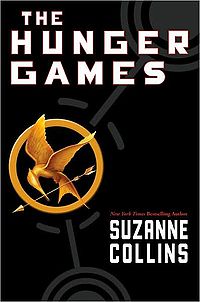 | At first glance, the story of teenagers fighting to their deaths in a dystopian post-apocalyptic world might seem too brutal. But it is precisely this black-and-white good versus evil (often seen in YA) that makes the plotting here so effective. Throughout the three books, the leader of the Capital puts our teenage heroes at risk for his person agenda. The stakes are very high, with the protagonists fighting for their lives, and eventually, the lives of everyone in North America. So, excellent plotting: check. |
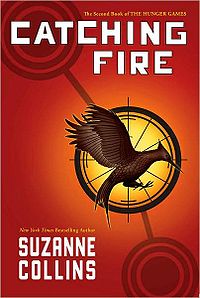 | I think the most effective aspect of these books, however, is the characterization. The protagonist, 16-year-old Katniss Everdeen is flawed and yet very sympathetic. Collins uses all the tricks of the writing trade to make the reader care about her. Katniss first shines when she volunteers to take her beloved sister's place in the Hunger Games. Protecting those less powerful evokes sympathy. Check. As I said, Katniss is flawed and she does do some very bad things BUT she feels very bad about them. It's okay with readers if characters do bad things--as long as they regret them. Check. She also defies authority. This is particularly appealing to young readers. Check. Collins uses these techniques masterfully throughout the books, and since readers are emotionally invested, the books' pacing is very fast. |
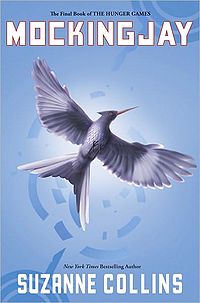 | As a kind of literature geek, the influences of, and references to, other cultural works is very appealing. For example, the name of the country in the books, Panem, refers directly to the ancient Roman saying "Panem et Circenses" which means "Bread and Circuses"--appeasing the populace by distracting them via food and entertainment. Collins also claims to be inspired by the ancient Greek story of Theseus and the Minotaur, wherein as punishment for past crimes, Minos forces Athens to sacrifice seven youths and seven maidens to the Minotaur. |
But, I don't think we can discuss The Hunger Games Trilogy without comparing it to George Orwell's classic dystopian novel 1984. There are many obvious similarities between the trilogy and 1984, including governmental control, personal independence and Big Brother watching. In my opinion, the most horrific aspect of 1984 was O'Brien's eventual control over Winston's thoughts and feelings. Without giving too much away, Collin's utilizes this horrible plot point as well. Wow! Very powerful!
Did you read these novels? What did you think?
Friday, March 4, 2011
BICHOK
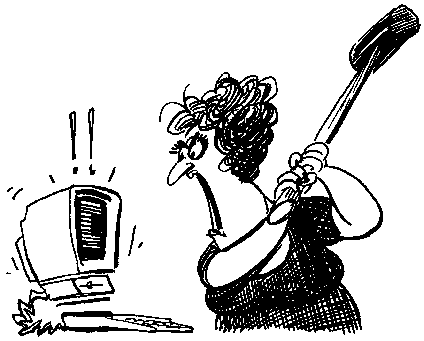 | Well, there are absolutely no excuses left. I know what I'm going to be doing all weekend ...BICHOK. Wish me luck. |
How about you? Do you have any weird writerly acronyms? Or even better, any tips for keeping your butt in the chair and your hands on the keyboard?
Wednesday, March 2, 2011
Writing Facilitates Thinking
A multitude of academics have studied how writing facilitates thinking. They've covered such topics as "How Writing Helps Physics Students Become Better Problem Solvers." What, you ask? How can writing and physics have anything to do with each other? In the aforementioned article, Judy Grumbacher required her students to keep "...a log about what they are learning in class...Some students...quickly discover that writing about physics helps them learn physics." There have been several similar studies including in disciplines such as math!
| The data seems to indicate everyone should be keeping a journal, a learning log for life, to help them facilitate thinking. Who knew? I just bought a new notebook for that very purpose. Of course, a blog is like a journal, too... |  |
How about you? Have you ever journaled? What do you get out of it?

